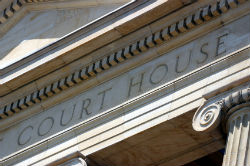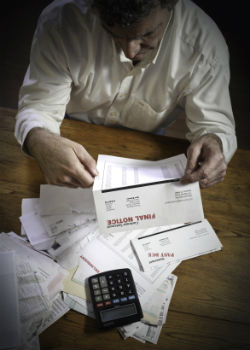The law gives people who file bankruptcy protection from creditors both during and after bankruptcy. A notice is sent to all creditors notifying them of the bankruptcy filing and warns the creditors not to take certain actions to try to collect the debt. Another notice is sent to creditors after the bankruptcy is over notifying creditors that a discharge order was issued, which means all debts were discharged unless the bankruptcy code makes it nondischargeable. What happens when creditors try to collect anyway? The person filing bankruptcy may be awarded damages, including attorney’s fees, emotional distress, and other allowable damages. In cases of serious creditor misconduct, the court may also impose punitive damages. The allowable damages and the procedures for seeking damages depend on whether the bankruptcy case is active or has discharged.
Violations of the Bankruptcy Automatic Stay
If a creditor makes an unlawful contact of a person in bankruptcy it violates the automatic stay that normally applies the instant the bankruptcy was filed. (The automatic stay does not apply in all cases so make sure it does in your case.) The stay prohibits creditors from taking certain actions to collect debts and the stay normally continues until the case ends, which usually is when the court issues a discharge order. The bankruptcy code entitles a person harmed by a “willful” violation of the stay to recover all actual damages, including costs, attorney’s fees and in appropriate case, punitive damages. A willful violation means: (1) the creditor knew of the bankruptcy when taking the illegal action, or (2) if the creditor was ignorant when taking the illegal action the creditor failed to correct it once they learned of the bankruptcy.
I believe it is very important to give the creditor a chance (in writing) to correct the error whenever possible before seeking damages. There are many unsophisticated creditors who don’t understand the bankruptcy laws and what is permitted. Suing a creditor for damages for an innocent violation on top of the creditor’s loss of the debt in bankruptcy strikes me as the wrong thing to do. Moreover, judges expect it unless the creditor’s actions are extreme and cause immediate damage. Failure to give the creditor the chance to correct the error is likely to cause the judge to be unreceptive to the request for damages or may even cause outright hostility if the judge thinks the attorney is using a technical violation to “shake down” a creditor.
When the creditor is given the chance to correct it and doesn’t, the request for damages has to be brought in an “adversary proceeding” in the bankruptcy court. An adversary proceeding is a lawsuit and is separate from the main bankruptcy case. There are many bankruptcy attorneys who have never filed an adversary proceeding and would much rather spend their time filing only the bankruptcy case and not straying into more complicated areas of bankruptcy. If that happens to you, make sure to talk to an attorney who is experienced in the area.
Most creditors sued in an adversary proceeding want to settle it quickly. I’ve settled many cases before the creditor filed anything with the court. The settlement amounts usually are modest but it depends on what the creditor did and the damage it caused. In one case, my clients had pawned a wedding ring before filing bankruptcy. We proposed in a bankruptcy plan to alter the required payments for that loan and the plan was approved. The pawnshop went ahead and sold the ring in violation of the plan. It took several months but we arranged for a U.S. Marshall and local police show up at the pawnshop to enforce the judgment. The owner quickly arranged to pay the judgment in full in cash. It’s unusual to have to go that far to collect but it was important to me to do what I could to get some compensation to my clients.
Violations of the Discharge Injunction
Once a discharge order has been issued, the automatic stay ends and a discharge injunction starts. The discharge injunction prohibits creditors from taking various actions to try to collect a discharged debt. Once again it is important to give the creditor notice (in writing) of the illegal action and a chance to cure it. If the creditor doesn’t correct it, the allowable damages and procedure for seeking damages are surprisingly different than for violation of the automatic stay. (This is based on the current state of case law in the Ninth Circuit Court of Appeals, which includes all of California. This could change in the future if new cases are decided or laws are passed.)
Violation of the discharge injunction has to be raised by contempt proceedings and is not done in an adversary proceeding. It is a “contested matter” which requires the filing of a motion that will be heard by the bankruptcy judge. Under the current state of the law in California, a person harmed by the violation does not have a “private right of action” against the creditor and instead the focus is supposed to be on forcing compliance with the court’s discharge injunction not compensating the harmed person. That means attorney’s fees incurred by the person filing bankruptcy in addressing violation of the discharge injunction are not allowable as damages. There is specific case law holding that once the violation is cured by the creditor, attorney’s fees incurred after that point cannot be awarded.
The differences between violations of the automatic stay and the discharge injunction are not always as big as it may sound. I had clients who were sued after discharge in a dispute between banks with loans on the home. The lenders disputed which of their loans was “senior” to the other and named my clients as defendants, which is a common practice outside of bankruptcy. The attorney who prepared and filed the complaint made a mistake in asking for attorney’s fees against my clients. I wrote to the attorney asking that the complaint be amended, which I fully expected would happen. The attorney, however, did not do so and we brought contempt proceedings. The judge awarded a modest amount as a sanction and the creditor appealed. More than two years later, the creditor was sanctioned an additional amount for the attorney’s fees incurred on appeal. In the end, the creditor paid nearly $20,000 plus the cost of its own attorney.




